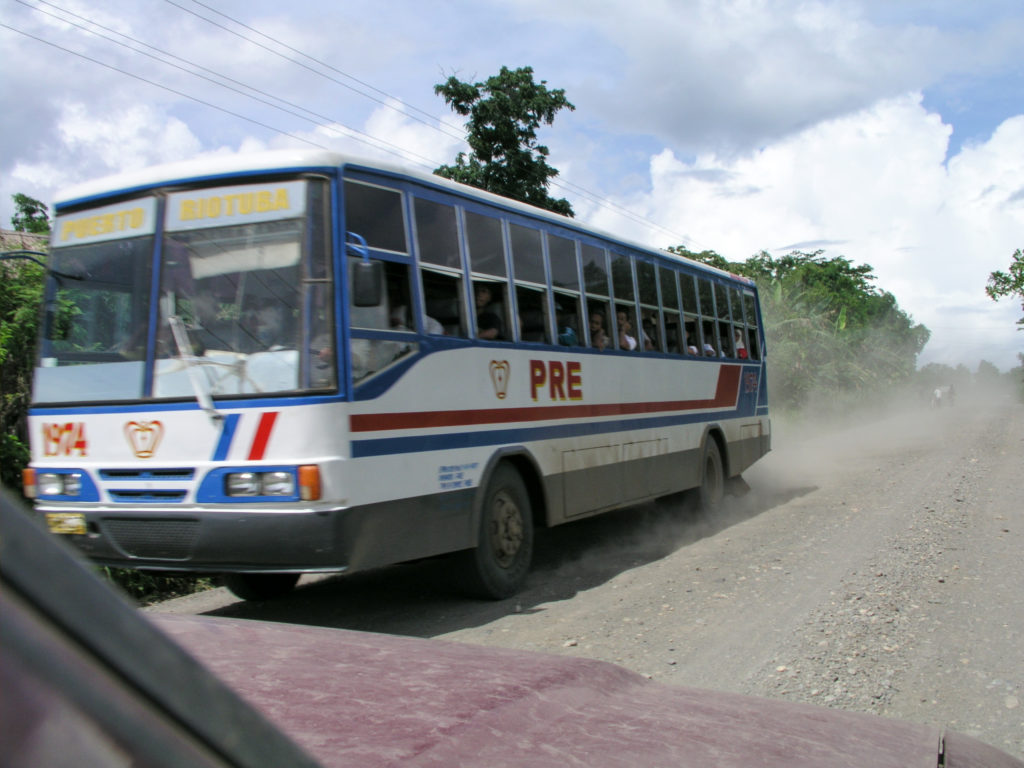The jet accelerated down the runway, its engine a dull roar, the increasing speed pressing me against my seat. I pushed back, leaning past my protesting siblings to get a glimpse out the window. My heart beat a tattoo in my chest. I was excited to experience each moment of our trip.
This was the day I had been waiting for. Leaving landlocked Tennessee and its gently rolling hills for the sharp mountains and jungles of the island of Palawan was a leap into the adventurous lifestyle I had always wanted. I was slightly disappointed that we wouldn’t be living among the headhunters of New Guinea, but Palawan was a more remote location than most ever experienced. Their wildlife was unusual, some even deadly. I was eager to see my first python and cobra.
I was eager too, to meet people of different cultures, hack trails through the thick jungles, learn about the novel diseases and animals there, and live off the land. The years of exploring and running free in the States would pale in comparison to what waited for me across the Pacific Ocean. I strained to see out the window, not put off by the view of the clouds. Soon we would drop lower and there would be much more to see and experience!
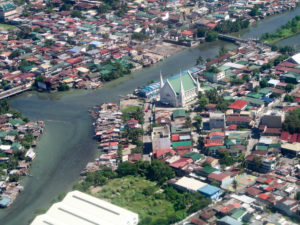
Our landing in Hong Kong was uneventful, and soon we boarded a flight to Manila, Philippines. When we disembarked from the plane, I was eager to stretch my legs and take in the sights. In the streets of the city, humidity pressed down on my neck like a damp blanket. I took a short breath, not sure if I wanted to fully take in the scent of sewer and sweat that hung in the air.
Tricycles and jeepneys wove through the streets honking. People nonchalantly dodged traffic. Vehicle traffic seemed to have the right of way in this place. I wondered how we would even cross the street. Nothing in the city was familiar. We darted across the street. I almost laughed, adrenaline pumping. We were out of place, surrounded by the unknown, but the thrum of the city was as exhilarating as it was unnerving. All of my senses were on high alert.
Maneuvering onto the waiting ferry, I strained to see around the boxes stacked in my arms. The harbor was bright with activity, bodies pressed together, new scents and shouts, unfamiliar language, and the sun at an unfamiliar slant. There was no quiet place to retreat to on the ferry. Everyone rode on the open decks, and this fueled my interest.
I circled around the decks, locals jostling against me. They clearly didn’t share the same concept of personal space that most Americans did. The bright smile of a little girl stood out, bridging the language gap and the many differences between us. There was warmth in her smile, and I felt seen and welcomed. Would most people we met be welcoming? I had never stopped to think about how we would be seen, but now I wondered.
I leaned against the railing as the ferry pulled from the harbor, and I laughed at the pure joy of pushing further into the unknown. Flying fish punctuated the water with splashes. They flashed silver like little stars rising and falling. Later, dolphins wove in and out of the waves. What would it be like to swim with them? They moved with ease, twisting and splashing in the water, teasing one another. Night fell. Gradually people quieted and only the occasional sound of a baby crying or a snore broke the splash of the ocean and the drone of the engine.
As the sun rose the next morning, my excitement did too. We passed green islands, and my stomach knotted tighter in anticipation of arrival. Twenty-four hours after boarding the ferry, we pulled into Puerto Princesa. The familiar was well behind us now. This place looked nothing like towns back home. Scattered businesses were housed along dusty streets in small huts or concrete buildings.
My dad had to make a phone call, and the bother of it all was unfamiliar. He haggled for the use of one of the area’s only phones and was not allowed to dial the number himself. No more picking up a phone to independently call anyone. Phone service was no longer a convenience. I eyed the jungle-covered mountain that rose in the middle of the island as my family gathered last supplies and then made plans for finding a hotel. I wondered if a place like this even had a hotel.
Our hotel, the Payuyo Pension, had a dirt yard. It was a square, concrete building, two stories tall. Most of the nearby buildings were smaller, one story affairs. We settled inside for the night under the breeze from the fan my father had requested. I kicked my brother who was next to me on the bed, but he was already asleep. How could he sleep with the jungle right at our door?
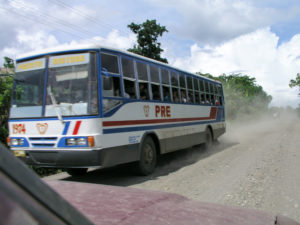
The next morning we loaded all of our belongings into the Puerto Royal Express bus. The bus was lined with hard benches, the windows shut tight and the temperatures outside and in, rising. The bus rocked down the National Highway. The highway soon became narrow, and the paving gave way to a gravel road that was scattered with gaping potholes. The bus bucked and lurched around the road like a bronco. I slammed into my sister, no fault of my own. She elbowed me and then slammed me back. Boxes slid around and we sweated. There was no AC inside the bus, and the windows remained closed because of the dusty road.The jade jungle dressed the sharp mountains around us with such lush thickness we ignored our lurching stomachs and the sweltering temperatures, and sometimes, sat silently as we took it all in.
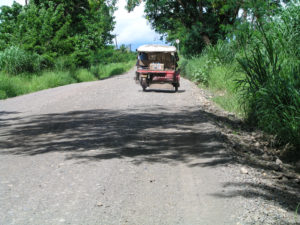
When we came into town, the traffic was both alarming and exhilarating. Vehicles honked and swerved, and no one seemed safe. A van in front of us veered too close to the shoulder of the road, over corrected, and careened up on two wheels. All four wheels touched down again, and it kept up its speed.
When we came into Brooke’s Point, the sun was low in the sky. Gravel crunched under our tires as we eased up to two concrete pillars and a bamboo gate, marking the entrance to our home. A large concrete house sat on the left, and a smaller concrete building stood in the thickening shadows beyond it. The small, square building was going to be our rental and base camp.
I walked towards the front door, a mixture of emotions churning in my gut. This was going to be home. My hand reached for a switch, but the switch produced nothing. No electricity. Then I noticed them, the eyes glowing on all levels of our walls. I felt my heartbeat and my interest rise. What kind of creatures were in our home?
When my father shone a flashlight into the darkness, hand-sized, brown “Gagamba,†or house spiders, looked back. They clung to the woven bamboo on the walls. Yes, this is what I have been waiting for, I thought.
My parents quickly decided not to stay that first night. “Can I stay?†I asked. “Sure,†they said, without thinking twice. I hadn’t thought twice either.
I gathered a mosquito net, mat, blanket, pillow, and flashlight from our supplies. When the door clicked shut, I was alone with the largest spiders I had ever seen, dozens of them. I swung the flashlight around the walls to take another good look, appreciating the shiver that ran up my spine. Tucking the light between my teeth, I applied myself to the challenge of setting up the mosquito net to keep out, not only the spiders, but malaria carrying mosquitoes, and snakes. I worked with plastic twine to secure the net to the bamboo wall coverings.
I felt a flush of accomplishment with my success. After tucking the edges of the net under my mat, I dropped quickly into a satisfying sleep. The insects outside droned loudly, and the ones inside were eaten by the spiders.
When I woke up, the spiders were gone, urgent seeming thoughts seemed to have replaced them. Where is everyone? Why did I stay here again? What’s for breakfast? Will they come back? When? I had no food or water with me, and my stomach growled. I didn’t know where they had spent the night or what their plans for the day were.
Out in the courtyard there were papaya, banana, and coconut trees, but none of the trees had ripe fruit within reach. I studied my surroundings, not seeing any prospects for food or water. If you are lost, stay put, I reasoned. My stomach and growing unease said otherwise. I sensed that the morning was passing quickly, and I wanted to get moving. It was not in my nature to wait.
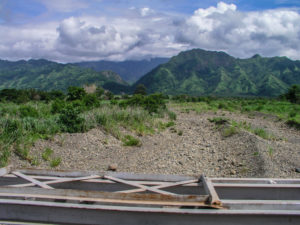
I walked out the front gate and down a dusty road surrounded by hints of jungle and sprinkled with huts that held people that spoke a language and lived a life of which I had no understanding. When I met someone, I asked about my family. They must have associated me with the only other light-skinned people in the area because they pointed me on. I inquired of others I saw, and eventually I found the small center of town.
An uninviting park stood on one side, the Palinki, or open air market, occupied the other. My stomach twisted with hunger, but nothing looked familiar. Raw fish was sprinkled with flies. I assumed I also saw vegetables in bins, but they were not vegetables I was familiar with.
I found my family in a rented room near the market and slipped in, hardly noticed. My family was concerned with finding food too. It was not easy to figure out what to eat and how to prepare it when everything was unfamiliar. We had a lot of learning ahead of us; but our future rose up as wild as the island mountains, adventures awaiting us all.
Many thanks to Esther Lipscomb for capturing this story and to Crissy Williams for her watchful editor’s eye.

